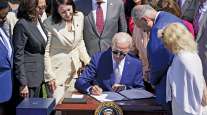Senior Reporter
Energy Efficiency Across Transportation Sector Focus of House Hearing

[Stay on top of transportation news: Get TTNews in your inbox.]
Congressional support for technologies that promote energy efficiency is key to reducing emissions across the transportation landscape, industry stakeholders told a House panel Sept. 18.
James Chen, vice president of public policy at Rivian Automotive, told the Energy Subcommittee the country benefits from “robust investment and support of transportation electrification technologies.”
“Such investment maintains America’s leadership in this developing technology, supports and promotes the economy and improves the environment, assuring cleaner air for all Americans,” Chen explained.

Chen
“Congress has a strong role to play in promoting research and development in this technology and supporting the manufacture and market introduction of this American innovation,” Chen added. The firm is an electric vehicle manufacturer.
Tim Cortes, vice president of hydrogen energy systems at Plug Power Inc., emphasized the need for enhancing infrastructure that would facilitate widespread adoption of innovative technologies. Hydrogen refueling infrastructure, as well as workforce development and training programs, are priorities for his sector, Cortes said. Plug Power focuses on cost-effective hydrogen and fuel cell power.
“Our goal is to make sure the important research labs and universities are doing is being utilized to create markets and get clean energy technologies in the hands of American taxpayers,” he said in prepared remarks.
Transportation leaders on Capitol Hill have sought to push a cleaner energy economy via alternative technologies. Comprehensive infrastructure legislation would serve as an ideal vehicle for advancing such an agenda, Democratic caucus leaders explained this year.
At the Sept. 18 hearing, subcommittee Chairman Conor Lamb (D-Pa.) acknowledged, however, reforming the transportation sector’s energy practices is challenging.
“It requires significant investment on our part and coordination across government, our labs and universities, and the private sector,” Lamb said. “But it’s a must-solve riddle, and I believe it is critical we develop and manufacture the answer — these technologies — here at home. Doing so is a clear win for our economy, national security and climate.”

Johnson
Science, Space and Technology Committee Chairwoman Eddie Bernice Johnson (D-Texas) said, “While there are many exciting developments in sustainable transportation, such as electric cars, alternative fuels and new concepts for mass transit systems, there are also many barriers to these technologies that we as a country must work to overcome.”
Subcommittee ranking Republican Randy Weber of Texas called on colleagues to embrace a long-term perspective on vehicle technology research.
“Industry simply cannot conduct the fundamental research needed for the next technology breakthrough. But industry can get these technologies out on the road,” Weber said. “By prioritizing basic research capabilities and user facilities that have broad applications, we can still enable the private sector to bring innovative new transportation technologies to the market, while advancing science and innovation across the American economy.”

Weber
Startup truck manufacturers Nikola Motor Co. and Tesla, for example, have planned battery-electric Class 8 models. Daimler Trucks North America rolled out a Freightliner eCascadia electric model, and commercial vehicle suppliers such as Cummins Inc., Dana Corp. and Meritor Inc. continue to advance their electrified agendas.
DOE’s Fuel Cell Technologies Office is dedicated to applied research, development and innovation. Last month, the department announced that about $40 million would fund projects that facilitate affordable and reliable large-scale hydrogen generation, transport, storage and utilization.
“As an energy carrier, hydrogen has the potential to unite our nation’s domestic energy resources,” Energy Secretary Rick Perry said. “These selections support DOE’s mission and advances our commitment to enable economic growth and energy security through the development of more affordable hydrogen technologies.”
The department also has dedicated research and testing to programs such as SuperTruck. Designed to improve heavy-duty truck freight efficiency, SuperTruck paved the way for SuperTruck II. Firms participating in SuperTruck II include Cummins, DTNA, Navistar Inc. and Volvo Technology of America.




